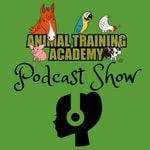Animal Behavior Conversations: The Podcast of The ABMA – Details, episodes & analysis
Podcast details
Technical and general information from the podcast's RSS feed.

Animal Behavior Conversations: The Podcast of The ABMA
Shane Gorbett, Board of Directors, The Animal Behavior Management Alliance
Frequency: 1 episode/13d. Total Eps: 68

Recent rankings
Latest chart positions across Apple Podcasts and Spotify rankings.
Apple Podcasts
🇺🇸 USA - petsAndAnimals
04/08/2025#46🇨🇦 Canada - petsAndAnimals
02/08/2025#83🇨🇦 Canada - petsAndAnimals
01/08/2025#68🇨🇦 Canada - petsAndAnimals
31/07/2025#62🇨🇦 Canada - petsAndAnimals
30/07/2025#49🇨🇦 Canada - petsAndAnimals
29/07/2025#36🇨🇦 Canada - petsAndAnimals
28/07/2025#24🇨🇦 Canada - petsAndAnimals
27/07/2025#9🇺🇸 USA - petsAndAnimals
27/07/2025#81🇨🇦 Canada - petsAndAnimals
26/07/2025#99
Spotify
No recent rankings available
Shared links between episodes and podcasts
Links found in episode descriptions and other podcasts that share them.
See allRSS feed quality and score
Technical evaluation of the podcast's RSS feed quality and structure.
See allScore global : 42%
Publication history
Monthly episode publishing history over the past years.
54: The Behaviors of Effectively Giving and Receiving Feedback with Scott Trauger, Natural Encounters, Inc.
Episode 54
mercredi 14 août 2024 • Duration 48:12
This episode continues on "The Behaviors of..." series which dives into the human side of the animal care field. In this episode Scott Trauger, Natural Encounters, Inc., dives deeper into a discussion centered around his presentation at the 2024 ABMA Annual Conference titled "Expanding Our Feedback Loop: Evolving the Way that We Give Feedback to Our Peers". Scott discusses the different types of feedback and considerations to think about in order to effectively give specific and honest, but also kind, feedback. Scott also discusses the thought of also giving choice and... control to people while providing feedback. Stay tuned in for a "Training Tale" about how Scott used his tree climbing skills and relationship to rescue a pied crow. For questions or suggestions about the podcast email abc@theabma.org and to reach Scott contact him on the ABMA Community or email michael.scott.trauger@gmail.com If you are an ABMA member you can watch Scott's presentation on animalprofessional.com Let's talk some training and banter about behavior!
2:10 Introduction to Scott Trauger
6:05 “Expanding Our Feedback Loop: Evolving the Ways we Give Feedback to Our Peers”
7:55 Using the word “Feedback” vs “Criticism”
12:05 Different Types of Feedback
18:40 Importance of Individual Relationships
23:30 Being honest and specific but also kind
27:15 Reinforcing the behaviors/responses you want to see happen again
29:30 Recapping or following up after feedback
31:15 Starting with heart and the human, not evidence
35:10 Giving choice and… control to people
43:00 “Training Tales”
53: Practical Applications of Choice and... Control" with Tegan Noel, San Diego Zoo Wildlife Alliance
Episode 53
mercredi 31 juillet 2024 • Duration 01:00:11
This episode we are joined by Tegan Noel, San Diego Zoo Wildlife Alliance, to discuss some practical applications and examples of providing choice and... control. This episode is a continuation of Episode 50 where Ken Ramirez broke down the science of choice and... control. The episode starts with Tegan commenting how the focus of those two topics have changed and shaped behavior in recent years. Additionally, she educates about what it means to remove "forced" choice and providing control through the use of encouraging animals to say now. Tegan gives thoughtful examples of providing choice and... control and why it is not only important for animal care professionals to have an understanding but also the public. Stay tuned in for Tegan's interesting "Training Tale" about a pygmy falcon who decided to create an awkward ending to a show. For questions or suggestions about the podcast email abc@theabma.org and to reach Tegan you can email tnoel@sdzwa.org Let's talk some training and banter about behavior!
2:45 Introduction to Teagan Noel
5:40 How has the focus on choice and control evolved and changed the way we care for animals?
11:30 Giving animals control and encouraging animals to “say no” while still receiving active participation
16:00 Practical examples of providing choice and control: Squirrel Monkeys
28:35 Practical example: Control over putting on a harness (coati, wombat)
31:10 Giving more control and removing “forced” choice
40:35 Importance of providing choice and control from the view of the pubic
49:40 Advice for starting the process of providing more control
54:35 “Training Tales”
44: How to Start a Behavior Program with Cassie Malina, Awesome Animal Solutions
Episode 44
mercredi 13 mars 2024 • Duration 58:58
This episode Cassie Malina, Awesome Animal Solutions, discusses a topic that has been requested by multiple listeners: How to start a behavior program! Cassie starts by detailing what a behavior program could entail, where to start, and how to approach leadership and your team about the process. Cassie also discusses all of the benefits of starting a behavior program to both animal and human wellness. Stay tuned in for two "Training Tales" from Cassie! The first involves a crowned crane learning the importance of an elevator and the second is a unique way in which a hyacinth macaw learned a voluntary towel behavior. For questions or suggestions about the podcast email abc@theabma.org To reach Cassie email awesomeanimalsolutions@gmail.com or visit her website https://www.awesomeanimalsolutions-cassiemalina.com Let's talk some training and banter about behavior!
1:35 Information about the 2024 Annual Conference
4:30 Introduction to Cassie Malina
11:05 What does a “Behavior Program” entail?
15:20 Where to start when beginning a behavior program?
18:55 Approaching leadership about starting a behavior program
24:20 How to prepare and coach your team to prepare for starting a program?
29:30 Behaviors or concepts to start with the animals in the new program?
33:45 Advice on building relationships with animals who previously didn’t have a relationship
39:40 Focusing a behavior plan on animals/species that previously didn’t have one
42:30 Reinforcing your teammates and recognizing the “wins”
45:30 How to balance the added time commitment of a behavior program
49:55 “Training Tales”
43: The Importance of Body Language While Training with Heather Samper, Moody Gardens and The ABMA
Episode 43
mercredi 28 février 2024 • Duration 01:22:47
This episode Heather Samper, Moody Gardens and “All Things ABMA”, discusses the importance of body language while training. The first part of the episode focuses on learning to read an animal learner’s body language, how to implement that into your sessions, and the benefits of being a keen listener of body language. The second portion of the episode focuses on why it is so vital for us as trainers to be cognizant of our own body language. Stay tuned in for two "Training Tales" from Heather! The first is a hilarious story involving a coati and Russian secret service agents (yes, you read that correctly) and the second is an in depth look into search and rescue with Heather’s beagle. For questions or suggestions about the podcast email abc@theabma.org To reach Heather about ABMA related discussions email website@theabma.org or theabma@theabma.org and for items regarding MyTrainingStore.com email info@mytrainingstore.com Let's talk some training and banter about behavior!
2:40 Introduction to Heather Samper
11:35 Why is it important to learn how to read an animal’s body language?
15:50 Implementing the skill of reading body language into training sessions
26:00 Under or Over Threshold
28:25 Universal body language “fundamentals”
37:05 Calm Baseline
41:00 Reinforcing for body language and the benefits
49:25 Importance of the trainer’s body language
1:00:00 “Training Tales”
42: The 10 Modern Principles of Shaping with Kelli Meyers, ZooTampa at Lowry Park
Episode 42
mercredi 14 février 2024 • Duration 39:25
This episode Kelli Meyers, ZooTampa at Lowry Park, discusses The 10 Modern Principles of Shaping as created by Karen Pryor and how they have evolved from "The 10 Laws of Shaping". Kelli breaks down each principle and gives advice on how to best implement and think about each of the principles. The 10 principles can be found below in the timestamps for this episode. Stay tuned in for Kelli's "Training Tale" about how she had to get really creative with her body positioning (hint: it included floating in the middle of the habitat) to help teach a sea lion a "clapping" behavior. For questions or suggestions about the podcast email abc@theabma.org and to reach Kelli you can email kelligolota@gmail.com Let's talk some training and banter about behavior!
1:40 Introduction to Kelli Meyers
4:30 Introduction to the 10 modern principles of shaping
6:50 Principle 1: Be prepared before you start
10:35 Principle 2: Ensure success at each step
12:25 Principle 3: Train one criterion at a time
14:10 Principle 4: Relax criteria when something changes
15:40 Principle 5: If one door close, find another
18:55 Principle 6: Keep training sessions continuous
20:20 Principle 7: Go back to “kindergarten” if necessary, take a step back and then move forward
21:45 Principle 8: Keep your attention on your learner
25:50 Principle 9: Stay ahead of your learner
26:45 Principle 10: Quit while you’re ahead
33:20 “Training Tales”
41: Human Perception on Animal Intelligence and Its Effect on Behavior, Esther Verhoeven
Episode 41
mercredi 31 janvier 2024 • Duration 36:30
This episode Esther Verhoeven discusses the human perception of animal intelligence (both from the point of view of an animal care professional and a guest) and how that effects behavior. The conversation starts with Esther discussing how behaviorists should view animal intelligence so that it doesn't create excuses or affect the way we manage the animals in our care. Esther finishes the discussion by commenting on educating guests about animal intelligence and the importance of the language that we use when talking to and about animals. Stay tuned in for Esther's "Training Tale" as she dives into discussing how dolphins perceived the idea of a behavior differently during scuba diving training sessions For questions or suggestions about the podcast email abc@theabma.org and to reach Esther you can find her on all major social medias (Estherv_n). Link to Esther's Ted Talk:https://www.youtube.com/watch?v=DCqOCQ4J9qc Let's talk some training and banter about behavior!
2:50 Introduction to Esther Verhoeven
6:00 How behaviorists/trainers should be viewing animal intelligence?
10:15 Responses to questions about animals being “more” or “less” intelligent than others
13:15 All animals have the ability to learn and, thus, can be trained
15:35 Using labels or intelligence as an excuse for not training
18:10 Animals are experts in human body language
19:05 The dangers of thinking for animals in our care
23:20 Educating the public about animal intelligence
26:05 Why our “chosen language” in how we talk to and talk about animals is important
28:45 “Training Tales”
40: The Role of Self-Regulation in Animal Wellbeing
Episode 40
mercredi 17 janvier 2024 • Duration 48:53
This episode Gabby Harris, uShake Sea World, discusses an article that she wrote for "Engage", the quarterly behavior publication of The ABMA. The article is titled "Welfare Considerations for Behavior Management of Animals in Human-Care: The Role of Self Regulation”. Gabby educates about why self-regulation can affect an animal's wellbeing and how we can provide opportunities for self-regulation to animals. Stay tuned in for two "Training Tales" each focusing on learning moments with dolphins! For questions or suggestions about the podcast email abc@theabma.org and to contact Gabby email gabby@seaworld.org.za or visit her website: www.touchinganimalsouls.blogspot.com To read the article in "Engage": engage Let's talk some training and banter about behavior!
4:40 Introduction to Gabby Harris
12:30 Summary of “Engage” article
15:45 Mental wellbeing of animals
18:25 Definition of Self-Regulation
22:40 Providing opportunities for self-regulation
42:25 Optimism of animals
43:50 “Training Tales”
39: Focusing on the Individual vs the Group or Species with Kyle Banton-Jones, Wild Enrichment
Episode 39
mercredi 13 décembre 2023 • Duration 46:27
This episode Kyle Banton-Jones, Wild Enrichment, discusses the importance of focusing on the individual vs the group or species in regards to behavioral husbandry. This episode was recorded in collaboration with Kyle's podcast and is a compliment to episode 53 of the Wild Enrichment Podcast, so be sure to check out here: https://wildenrichment.podbean.com In continuation from that episode, Kyle talks about the evolution of enrichment and advancing behavioral husbandry of under-represented species. Additionally, Kyle discusses an article that he wrote, "Behavioral Husbandry for the Individual", and gives considerations for focusing on both the species/group while also ensuring that individual animal's needs are met. Stay tuned in for Kyle's "Training Tale" about how a macaw gave him a lightbulb moment about communicating with animals while training . For questions or suggestions about the podcast email abc@theabma.org and to reach Kyle email kyle@wildenrichment.com or contact any of Wild Enrichment's social channels. To learn more about Wild Enrichment, read the article that this episode discusses, and utilize their resources visit: https://wildenrichment.com Let's talk some training!
6:00 Introduction to Kyle Banton-Jones and Wild Enrichment
10:50 How the word “enrichment” has evolved and changed
13:45 Advancing behavioral husbandry in “under-represented” species
20:20 Behavioral Husbandry for the Individual
23:45 Considerations from the viewpoint of the species
28:40 Considerations from the viewpoint of the individual
31:45 Providing opportunities for the group while also providing opportunities for the individual
34:15 Focusing on one individual’s enrichment goals within a group
38:10 The importance of applicable data collection
39:30 “Training Tales”
38: Prompts - Providing Additional Information with Dani Larson, Southwick's Zoo
Episode 38
mercredi 6 décembre 2023 • Duration 51:32
This episode Dani Larson, Southwick's Zoo, discusses prompts and how they provide additional information to animal learners. Dani gives great examples of prompts and discusses the difference between a prompt and a discriminative stimulus. Additionally, Dani educates about the importance of fading prompts, but also how to utilize prompts when a behavior breakdown. Stay tuned in for a wild "Training Tale" about how Dani used a soup spoon to teach her dog "Paw". For questions or suggestions about the podcast email abc@theabma.org and to reach Dani contact her on Instagram, @danipoirier, or email dani@southwickszoo.com Let's talk some training!
5:55 Introduction to Dani Larson
11:25 Definition of a Prompt
13:40 Examples of prompts
18:35 The difference between a prompt and a discriminative stimulus (cue)
21:30 Fading out prompts
29:15 How to fade out a prompt
38:40 How to utilize a prompt when a behavior breaks down
43:25 “Training Tales”
37: The Behaviors of Allyship with Meghan Holst, co-founder of MIAZS (Minorities in Aquarium and Zoo Science)
Episode 37
mercredi 15 novembre 2023 • Duration 42:58
This episode Meghan Holst, one of the co-founders of MIAZS (Minorities in Aquarium and Zoo Science), adds another addition to "The Behaviors of..." series by discussing the behaviors of allyship and giving insight in to MIAZS as an organization. Meghan educates about what allyship is and ways in which everyone can be involved in being an ally. Meghan also talks about how to professionally and effectively bring up social justice issues in a workplace and why human behavior is just as important as animal behavior. "The healthier and supported humans are, the healthier and supported the animals are." Stay tuned for Meghan's "Training Tale" about conditioning an electrical signal bridge for sharks. For questions or suggestions about the podcast email abc@theabma.org and to reach Meghan email executivedirector@miasz.org. Also, check out all of the free, informational resources offered by MIAZS on their website. https://www.miazs.org Let's talk some training!
3:35 Introduction to Meghan Holst
8:30 All about MIAZS (Minorities in Aquarium and Zoo Sciences)
17:30 How to get involved and support MIAZS
19:35 What is Allyship?
23:00 Behaviors of being an ally
28:15 How to bring up social justice issues in the workplace
33:20 Why is human behavior just as important as animal behavior
38:40 “Training Tales”


